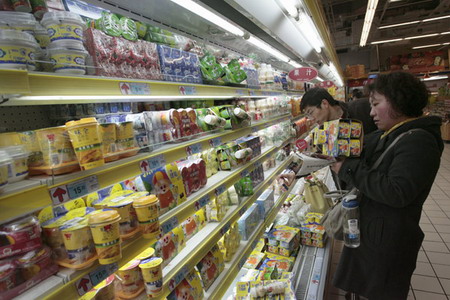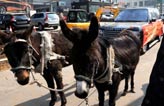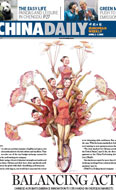Economy
Licensing to ensure dairy standards
Updated: 2011-03-30 11:09
By He Dan and Cang Wei (China Daily)
|
 |
|
Consumers buy milk products at a supermarket in Nanjing, capital of Jiangsu province, earlier this month. [Provided to China Daily] |
Starting in April, dairy retailers will be required to apply for one of two types licenses. One will allow them to sell dairy products that contain baby formula and the other will allow them to sell formula-free dairy products, the administration said on its website on Monday.
Retailers that sell infant formula without a proper approval will be punished, according to the regulations.
The central government has tightened its supervision of food products in response to public concerns over food safety, which have grown more intense following discoveries of the toxic substance melamine in baby formula in 2008 and, more recently, of illegal additives in pork.Among the foods of most concern to safety inspectors are dairy products, edible oils, meats, health foods, food additives and liquors, according to a statement released this month by the Office of the Food Safety Commission under the State Council.
The licensing requirement for dairy retailers is the latest step in China's campaign to ensure the safety of its food supply.
"I hope the licensing will act as the last line of defense against toxic milk products," said Dong Jinshi, executive vice-president of the International Food Packaging Association, a Hong Kong-based non-government organization.
Despite the work, some potentially dangerous milk products still enter the market under the noses of quality inspectors, Dong told China Daily on Tuesday.
"The new regulations, if successfully put into effect, will push retailers to become more prudent in choosing dairy suppliers because their licenses may be revoked if they sell counterfeit or toxic dairy products."
A shopkeeper interviewed by China Daily on Tuesday applauded the new policy.
| ||||
"I'll apply for the license as soon as I receive a notice from the local industrial and commercial department."
Even so, opponents argue that adopting a licensing requirement for a few products will not be enough to ensure the safety of China's food supply.
"Imagine that if someday noodles were found to be tainted," said Li Zhimin, a resident in Shijiazhuang city, North China's Hebei province. "Would authorities then come up with the idea of issuing licenses for noodle sellers?"
"It's more important to find and fix the flaws in the administration sector, which allow unscrupulous producers to bring unsafe food to market."
A dairy-industry expert also said the regulations will "have few effects" if they do not apply to online sellers of dairy products.
"Online shopping has become more and more popular in China, and it's a pity that the supervision of cyber businesses has lagged far behind," said Wang Dingmian, former chairman of the Guangdong Provincial Dairy Association.
He said he has noticed an increase in the number of phone calls he has received complaining about milk powders.
Wang said online retailers of dairy products and those selling the products in stores should be made subject to the same supervision, which will help to protect consumers' health.
E-paper

Rise and shine
The Chinese solar energy industry is heating up following recent setbacks in the nuclear sector
Preview of the coming issue
Bombs aim for regime change
CSI, with a twist
Specials

The queen of panda cubs
Spanish Queen Sofia laughs as she plays with a panda.

London's Olympic Stadium
Construction on the flagship stadium for the 2012 London Olympics was completed Tuesday.

Donkey-powered Land Rover
Two donkeys pull a broken-down Land Rover in Shenyang, Liaoning province.




